POW Alliance Manager Graham Zimmerman Talks Imperfect Advocacy with the United Nations
Professional alpinist and POW Athlete Alliance Manager Graham Zimmerman has dedicated his life to his sport and climate advocacy work. His passion for this work is fueled by watching the places he loves to climb and the communities within those fragile ecosystems be impacted by climate change.
His experience as both a climber and climate advocate recently landed him on the stage at the United Nations headquarters in New York City where he discussed the intersection of climate and sport for the International Day of Sport of Development and Peace. We sat down with Graham to learn more about his personal climate journey, how he lives an examined lifestyle, his experience at the UN and to discuss what tips he has for someone just starting out on their own climate journey.
POW: To just start off, can you give a brief background on your climbing career and your current role within POW now?
Graham Zimmerman: I am a professional alpinist, living in Bend, Oregon with my wife Shannon and our dog Pebble. My focus as a climber has been trying new routes and climbing peaks that are super technical in the big mountains of the world, particularly in the Pakistani Karakoram and the Alaska Range.
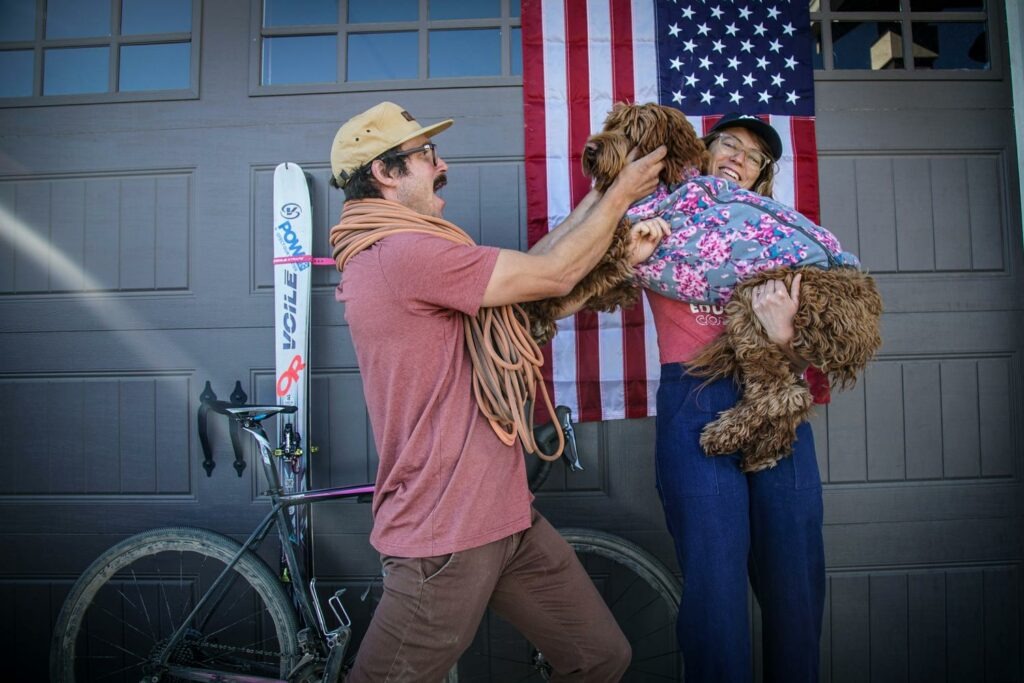
While spending time in the big mountains of the world, I have consistently seen the impacts of climate change and for me, personally, that drove a lot of anxiety and fear. I didn’t really feel like I had any ability to drive action around climate solutions until I fell in with Protect Our Winters back in 2015 when someone from the POW team reached out and said I should be a climate advocate. At first I thought “Oh no, I can’t do that. Do you know how much time I spend on an airplane?” Their response was, “Actually you’re perfect for it because you have these stories that you can tell that can really help us drive change in policy.”
Climate advocacy has been a really powerful journey for me, and it started when I joined the Climb Alliance. Then I became the Climb Alliance Team Captain and these days, I actually am on staff with Protect Our Winters splitting my time between being a pro athlete and managing the Athlete Alliance program. It has been a really wonderful experience because I am able to take other professional athletes on that same journey that POW took me on. I’m able to tell them that their voice matters and that we need them in this conversation, and then subsequently, give them the tools and the opportunities to go advocate for systemic climate action.
POW: Can you talk about how climate related impacts change the way you get outside?
GZ: The hazards in the mountains associated with climate are immense. When we talk about changing seasons, reducing glaciers and a reduced snowpack—it means that the mountains are changing at a really accelerated rate. I don’t mean that in terms of spring to summer and summer to fall. I mean that over the course of decades we’re seeing major changes taking place in these mountains that are making it so that the wisdom of past generations is quickly losing relevance. We are in a place where we have to constantly be making decisions in the mountains based on this changing and how it impacts our ability to stay safe, and subsequently, to succeed. It means that research we find on potential new objectives or pre-existing objectives is no longer true. A base camp that at one point was safe, might not be safe anymore because of the changes taking place, and climbing is a sport that really leans heavily into its own personal history around how we make decisions in the mountains. The fact that history is becoming less and less relevant makes things really challenging and is something that honestly makes me concerned about the folks in my community.
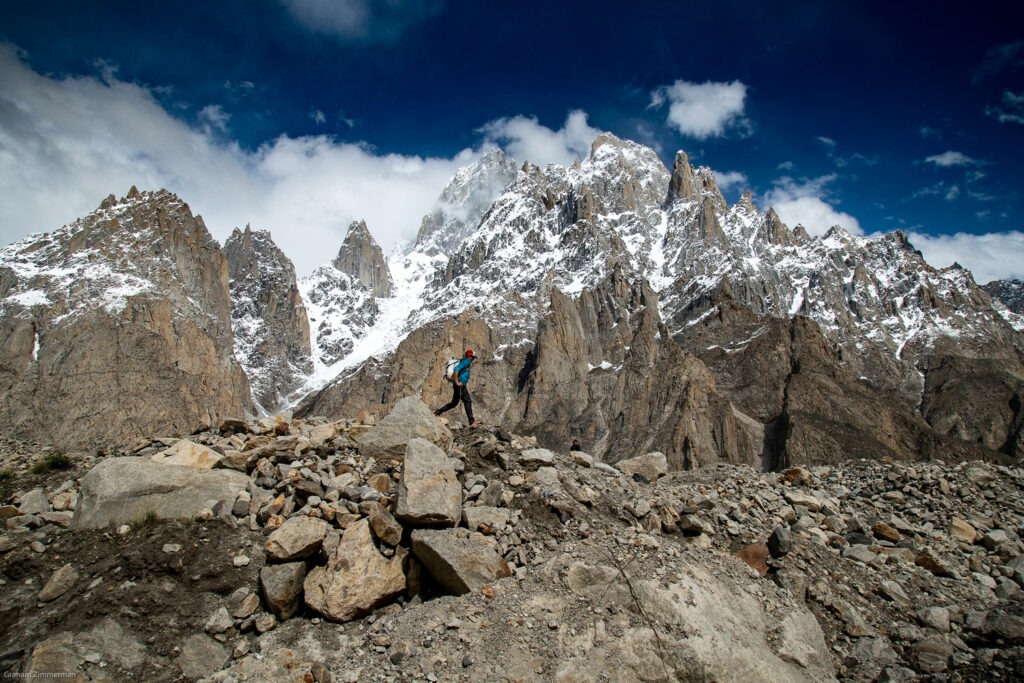
I think it’s also really important to bring up the fact that there are people who live in these places that are rapidly changing. For instance, I go to the Pakistani Karakoram to go climb. But there are people that live there all the time and those changes that I’m talking about are impacting those communities every day. I make good decisions so that I can come home safe and maybe climb a new route, but my buddy who lives in one of the villages there is stuck with those changes all the time. He is having to make decisions about how he and his family, and his community stay safe in that dramatically affected environment. Those folks don’t have a carbon footprint. They’re not saying “Oh, I’ll drive less and it’ll fix this.” They’re building rock cabins so that when a glacial flood comes due to glacial recession that their whole village doesn’t get wiped out. They’re setting themselves up so they can deal with disrupted water resources or a disrupted growing season for crops. Their ability to survive is directly impacted throughout the year. The important thing to remember is that we talk about these things as they impact our sports, but there are people who are being impacted in their everyday lives by climate change as well.
POW: You were recently invited to be a part of the United Nations’ International Day of Sport and Development because of your background in the climbing community and climate space. How did the opportunity to be on the panel come about?
GZ: I’ll first say that the United Nations is an organization that I have thought is really cool for a long time.
Protect Our Winters has been slowly building a relationship with the United Nations over the last few years. Last year, we had professional cross country skier, Olympian and POW Alliance & Board member Jessie Diggins involved with the same event in a digital capacity due to the world that we were living in with the pandemic. This year, they got in touch with me in order to continue building that relationship between the United Nations and to present on their International Day of Sport panel. It was really gratifying because not only does this show that our work at POW is being noticed, but also the United Nations is seeing on a larger scale, that athletes are trusted messengers that can drive impact.
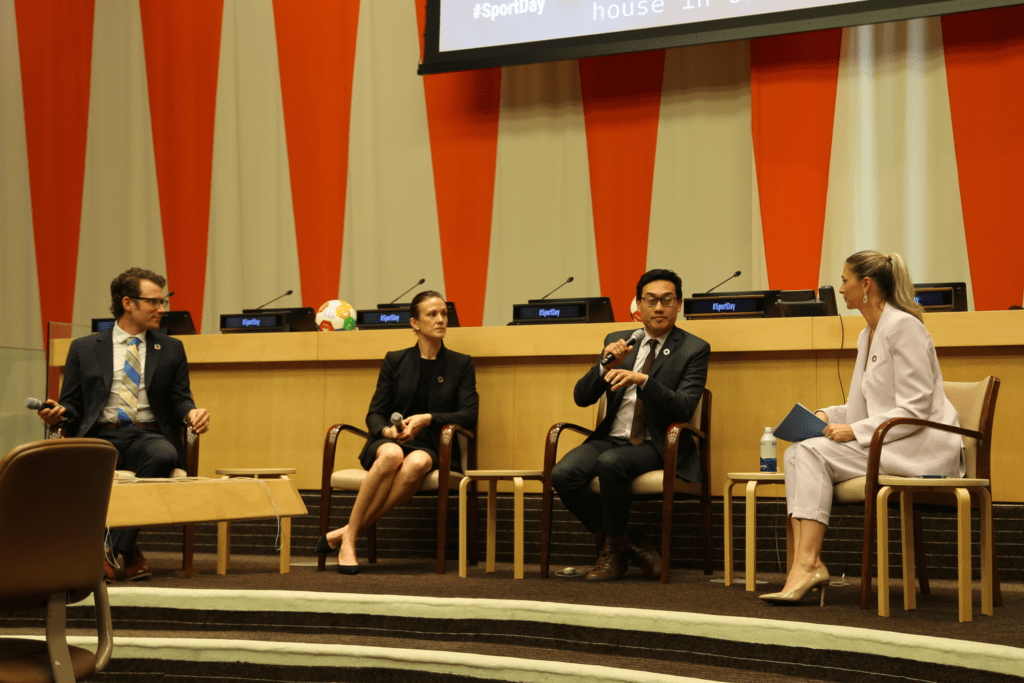
POW: Who else was on the panel with you?
GZ: I was on a panel with Lauren Tracy from USA, Tennis and Omar Mitchell who runs sustainability for the NHL and we were being interviewed during that panel by a woman named Tabitha Lipkin who is a journalist and national TV personality.
POW: What were some of the key talking points and takeaways from the discussion?
GZ: I’m going to share something else besides that really quickly because one of my favorite parts of the whole thing besides being able to have awesome conversations was those little ear pieces that they have where you get to listen to all the translations. You can see all the translators on screens and getting to put on that earpiece and cycle through the translations was really cool.
Anyways, we talked a lot about personal versus systemic change and how organizations, like the NHL and USA Tennis can advocate to drive some of that systemic change. Those are big organizations that have a lot of potential for impact and climate action and hearing them take that on was really cool.
There was also a broader discussion about how the concept of imperfect advocacy is for everyone, including professional athletes. Oftentimes there’s a barrier to entry due to perceived hypocrisy. We had a really good discussion around how imperfect advocacy is an important first step in learning how to utilize our voices to drive action on climate. It was incredible to be up there with two really badass folks speaking to a broad global audience about getting over that perceived hypocrisy and recognizing that we are operating in a system that is super reliant on the burning of fossil fuels and we cannot let that get in the way of us being advocates for driving change within that system.
POW: What role do you think athletes of all kinds can play in helping move the needle toward a clean energy future?
GZ: Athletes are in this really cool position where we speak to a broad audience as trusted messengers. We are able to talk to the public about how they can be driving action by showing others how they can be thinking about the role they play in society and the levers of change that are available to them. Then, we can teach them how to pull those levers in order to drive climate action in the world around them.
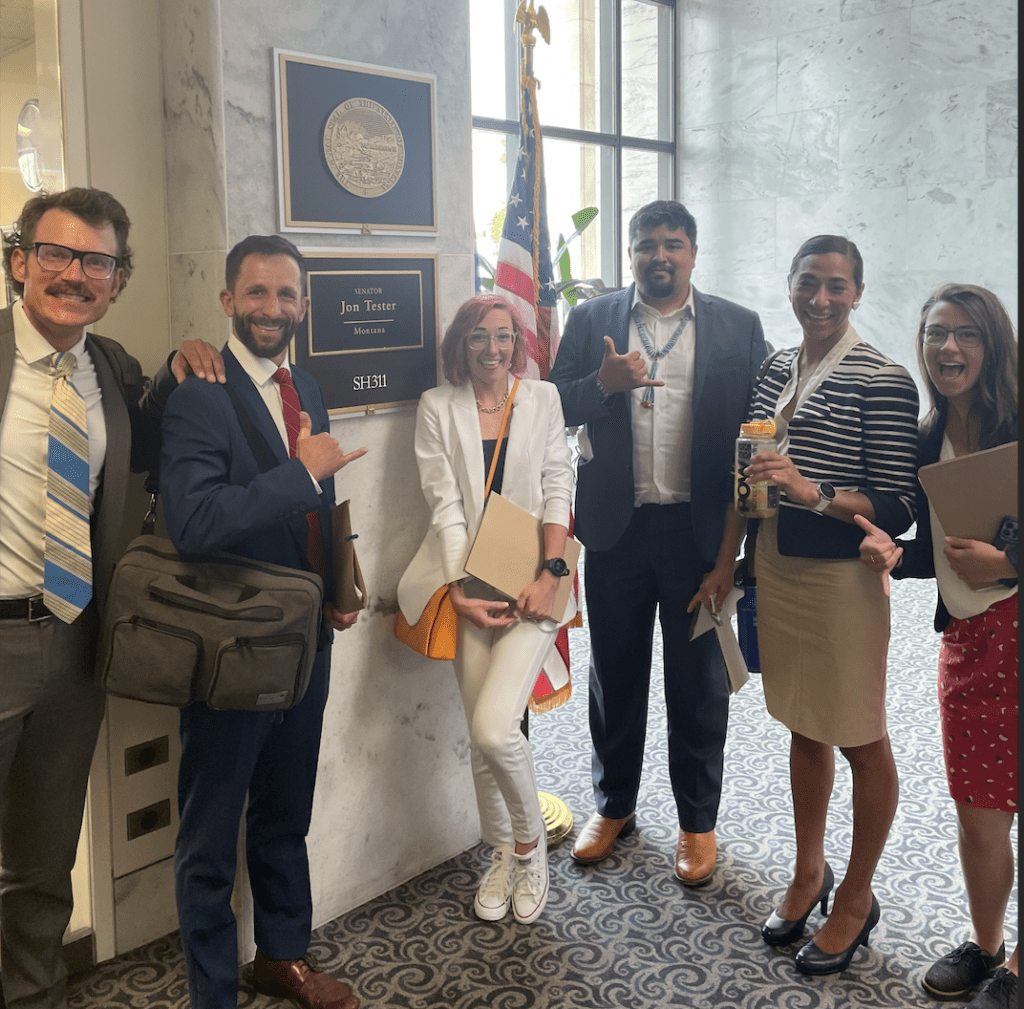
Athletes also have affiliations and roles within a variety of organizations and companies. We have these deep connections and can play a role in giving those organizations the opportunity to take on change. That is systemic change within the sports that we play. We can also represent the public and the organizations we’re affiliated with in meetings with members of our government, which we do at POW a lot. We’re able to have these conversations with lawmakers and say “I work with the American Alpine Club and POW. I also represent a broad community of folks who are demanding climate action.” Athletes have a lot of ability to drive change in the world around us.
The last thing that’s really important and at the core of why I believe in POW’s mission and why I think having professional athletes be advocates is so critical. This work is hard and it requires you to be bold and that’s what athletes do. If you’re running a track meet, playing in an international sporting match or climbing a big wall you have to be brave. It’s going to take a lot of bravery to solve our climate crisis as well, so that is a directly transferable skill that athletes can bring to this work.
POW: Aside from the cool earpiece… What was the most inspiring or impactful part of the panel discussion for you?
GZ: The biggest thing for me was hearing how the conversation that we had resonated with the folks who were also there. Sometimes when we’re working in this space, it feels like we’re screaming into the void. Having those opportunities where you have positive feedback or even a little bit of constructive criticism is really helpful. That’s something that helps me fill my cup while doing this work.
In the follow-up from the panel with the other panelists and members from the United Nations team, there was a lot of positive feedback. I was told the work that we’re doing at POW is driving the needle and to let the folks at the UN know how they can help.
In a world where this feels like we are fighting something that is so much bigger than us, getting those bits of feedback is really helpful. The fact that they want to continue this work together and continue the partnership between POW and the United Nations is unreal. I came away feeling like this work is going somewhere, and that’s what we need.
POW: What advice would you give someone who’s just starting out on their own climate advocacy journey?
GZ: Climate impacts everybody and everything that we do and we all have the opportunity to be a climate advocate in our own way.
For example, I had this great conversation with a friend recently who works in the mental health field who felt like they needed to pivot their whole career into working on climate issues. But the reality is, they’re working in the climate space right now. One of the biggest impacts of the climate crisis is climate anxiety, and people having mental health issues associated with how much stress is in their lives because of potential impacts of climate change. Therefore, if you are working in mental health, you are doing climate work. Another person I know works in the tech world in database management, which seems really far away from climate work. But he’s working on efficiencies within the database system and reduced the electrical needs for an expanding database for a major corporation in such a significant way that it is actually having a positive climate impact because that organization is using less electricity.
That’s a long way of saying there are levers which we can identify and learn to operate that can change the world around us. Don’t upend your entire life looking for some kind of quest. Look at what you’re currently doing and look at how it’s being impacted by climate. Then, think about ways that you, the organization you work for or the community around you can drive change.
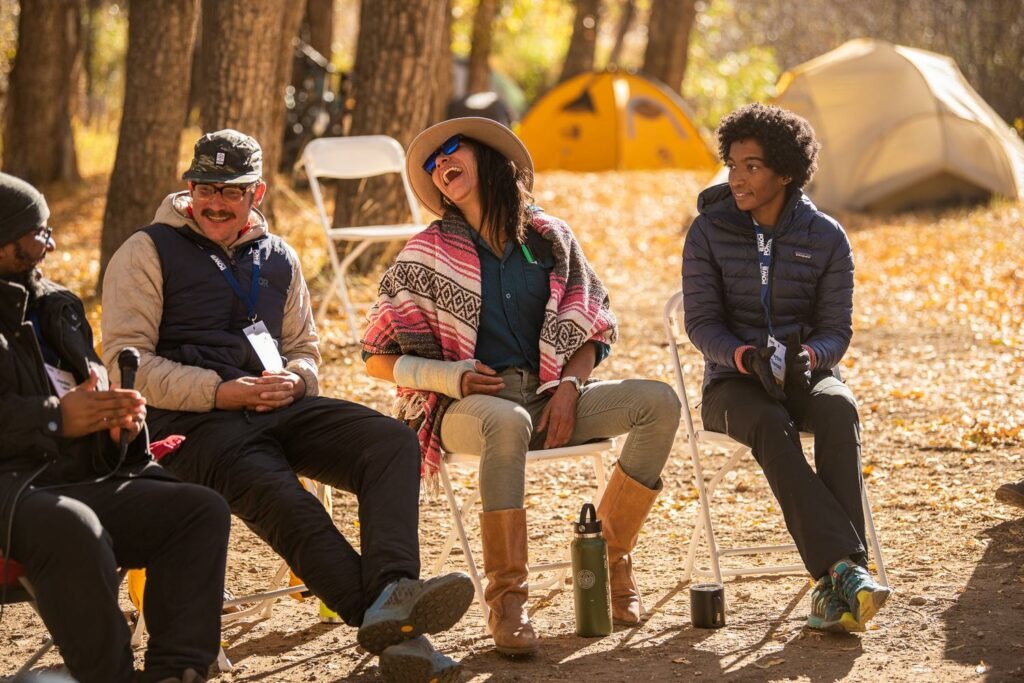
One of the things that we really lean into at Protect Our Winters is the importance of storytelling in order to drive connection between people and climate issues. We work with folks on how they can utilize their stories from the outdoors in order to drive change in the world around them. If you’re on the POW blog reading this there’s a pretty high probability that you are somebody who spends time outside. That means you have stories about how things that you love in places that you love are being impacted by climate and that is one of the most important tools that you can have in order to drive climate action. As it turns out, just hitting people with the facts is not something that is going to drive a lot of change. Instead, creating connections and meeting people where they’re at is the best way to start those conversations and drive the action that we need. The best way to create those connections and find that Common Ground is through stories.
You can watch the livestream of the panel discussion below:
Are you looking for ways in which you can learn to better utilize your voice as a climate advocate? POW now offers an 8-part online educational series called Finding Common Ground: How To Be A Climate Advocate. The course is taught by POW Alliance members, like Graham, who have stood on the front lines of climate change, bearing witness to the environmental changes in real time and working tirelessly advocating for the outdoors in front of lawmakers in Washington D.C. During the course you’ll learn about the history of climate policy, the science of climate change and how you can support scientists, how to leverage your voice and speak out on climate in your community and how you can find Common Ground with others.
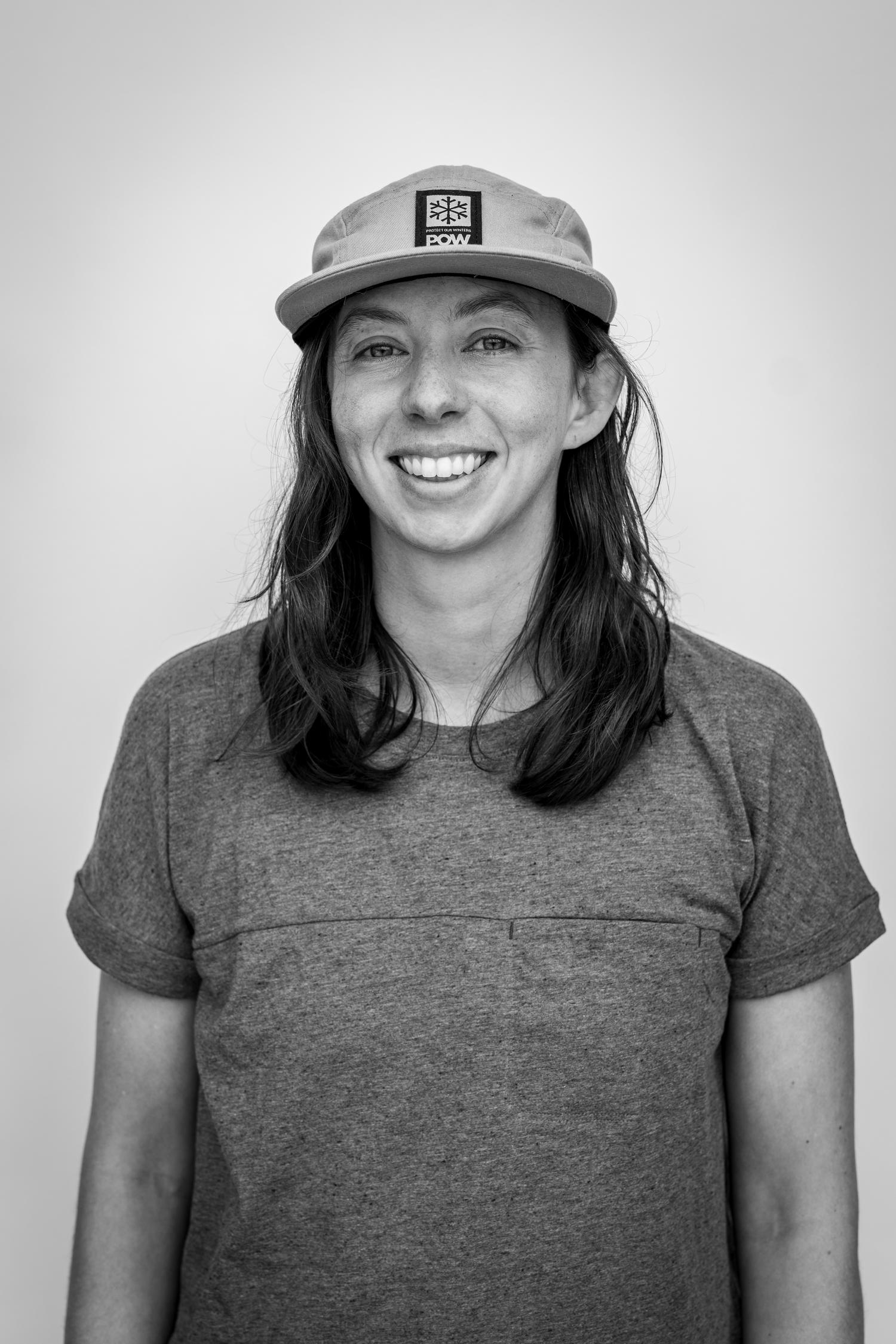
Author: Stacie Sullivan
Stacie always knew she wanted to pursue a career in the ski industry from a young age, having first clicked into skis at the age of 4 and writing her 8th grade career project on being a professional skier. While her dreams of becoming a professional athlete didn’t quite pan out the way she planned at […]
